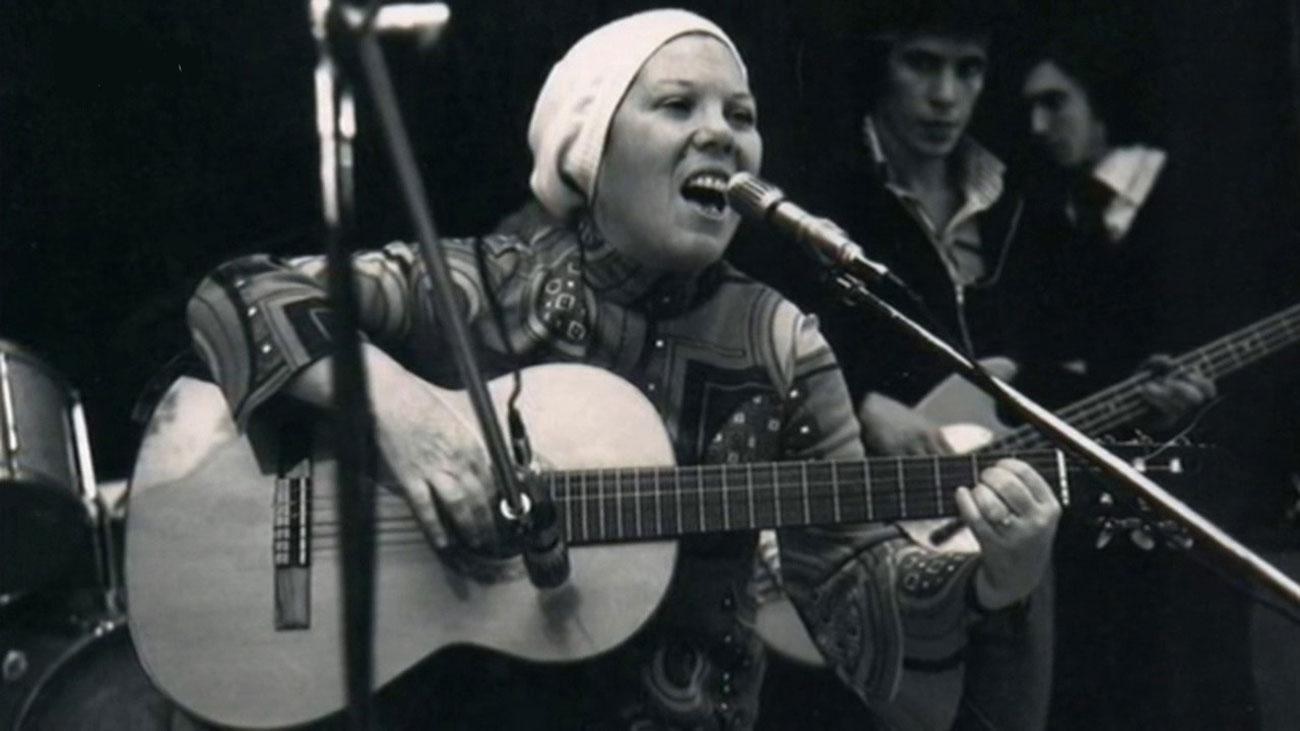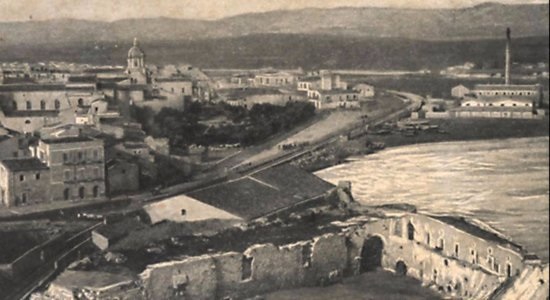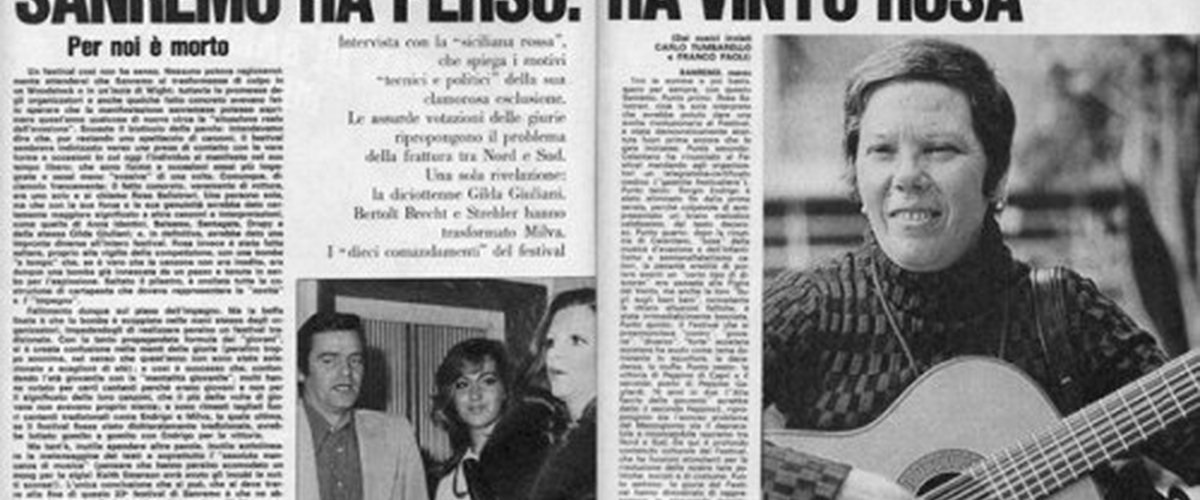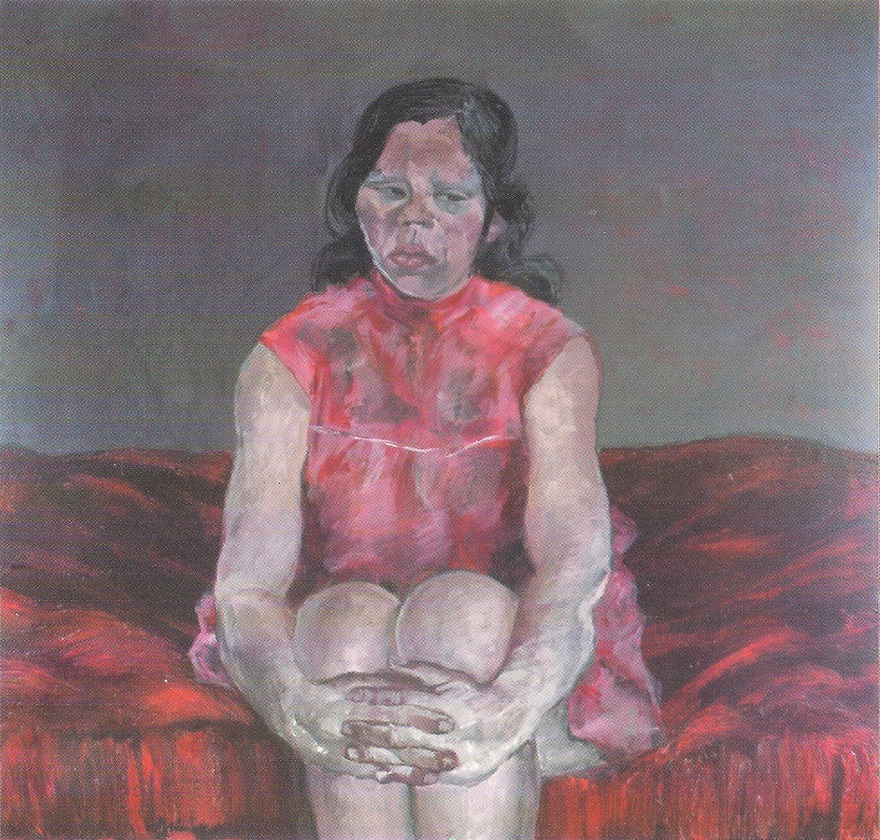
True songs that speak of suffering, of family dramas, can only be written by those who live a tormented existence. Little girls, forced into early adulthood, when they become butterflies they cry out, and are the voice against misery, hunger, abuse, exploitation, the humiliation of women. Some of them go on to depression, suicide or forced exile. One among many, however, Rosa Balistreri, took up her guitar to sing about the horror she had seen and experienced first-hand. Unknown to the large television audience, which in those years discriminated between singer-songwriters, she remained in that bubble – a character who was too uncomfortable, almost violent in representing society’s problems and inequalities[1].
Rosa lacerates the soul and digs into the roots of the thousand-year history of a bitter and beautiful land like Sicily[2]. Her songs of protest give voice to the peasants, the zolfatari, the emigrants, the prisoners – to so many exploited and humiliated people, just like her, with a tormented life behind her[3], made up of deceit and deception. A lonely woman, repeatedly rejected and abandoned. Rosa’s is an existence without peace, where the violence of men who are fathers and masters is a scourge that leaves behind a trail of death and devastation[4]. For Rosa’s life has been a path studded with hardship and privation[5] since her birth, in Licata, on 21 March 1927, the day of the spring equinox[6]. She lives her childhood and youth in the Marina district – a horror of misery, without running water, without electricity, without food, without hope[7].
A childhood on the edge of civilisation

Below, the ruined houses of Marina di Licata in the 1930s[8]
Licata is a small village in the Agrigento area, on the southern coast of Sicily, which has made headlines for the wicked squatting ordered by the Mafia and the demolition of dozens of 19th-century houses by order of an evidently conniving mayor[9]. Rosa is born into a very poor family, her mother works at home, her only income comes from her father’s small carpentry jobs[10]: a jealous man, often violent, fond of gambling and wine, who contrasts with her mother, a simple and good woman. Rosa is the eldest, and has two sisters and a brother, disabled from birth[11].
They send her to work straight away, no way of letting her attend school[12]. From an early age she helps her father, who repairs chairs, walking the length and breadth of the city barefoot, in all seasons. Sometimes the two also go to neighbouring towns, Palma di Montechiaro, Butera, Riesi, and that’s a lot of kilometres for a little girl. In the summer season, she goes with her father to glean in the sunny fields, bringing home a few handfuls of grain that feed the family for a few days.
Rosa unloads her anger and discomfort by singing at the top of her voice along the narrow streets of the Marina. At fifteen, she is called to sing in church at baptisms and weddings, and she wears shoes for the first time[13]. She is talented and passionate, which is not very common for a girl of her age and from that social background. She possesses a very deep soul. She knows how the world works even without having any primary education, yet she cannot even read or write[14]. She cannot marry her cousin Angelino, because her future mother-in-law demands the trousseau that Rosa’s family cannot afford.
At the age of sixteen she is given in marriage to Gioacchino Torregrossa known as “Iachinuzzu”[15]. another inhabitant of Marina. Deprivation and mistreatment cause the death of the couple’s first child, but shortly afterwards, Rosa is pregnant again[16]. Angela Torregrossa, her only living child, is born[17]. Gioacchino is her alcoholic husband[18], whom, years later, in a concert, Rosa calls ‘latru, jucaturi e ‘mbriacuni’. Rosa works her fingers to the bone to prepare a dowry for her daughter, but her husband steals the trousseau she has put aside and loses it at the game. Enraged, she attacks him and wounds him with a file[19]. Believing she has killed him, she turns herself in to the Carabinieri, and ends up in prison for six months[20].
Released, she runs away from home. To support her daughter and help her family of origin, she works many jobs. A few months in a glassworks[21] , where she is constantly harassed by the owner[22]. Then as a picker and seller of snails, capers, prickly pears, sardines in the salt warehouses. It is precisely in the fish markets, in the taverns of the slums, in the smelly alleys, where children and old men vie with each other, where the human being is truest and most naked in his splendour and horror, that Rosa is formed as a singer, poet, artist[23]. She goes into the service of a noble family in Palermo, and puts her daughter in boarding school. She learns to read and write. She falls in love with her master’s son and becomes pregnant[24]. Moved by her illusions towards the young man, she is urged by him to steal money from her parents’ house. Discovered, she flees to Sondrio to the sanatorium where her mother is hospitalised.
Who told you I must leave you, better death and not this pain. Ouch, ouch, ouch, I die, I die, I die, breath of my heart, my love is you. Who told you little one, my heart is being torn apart little by little. Ouch, ouch, ouch, I die, I die, breath of my heart, my love is you. I made my first love with you, and you ungrateful one forgot me. Peace let us make, oh my little one, breath of my soul, my love is you[25]
They find her and sentence her to six months in prison, which she serves in Palermo. Coming out of prison, desperate, she is forced, even though pregnant, to live as a nomad, sleeping on station seats or at hospital gates, until she is taken in by a midwife friend who helps her give birth. Her baby, however, is stillborn. Once she has recovered from the labours of childbirth, helped by her friend, she goes into the service of Count Testa, gaining a certain serenity. After a short time, however, she has to leave the count’s house, who nevertheless continues to protect her, providing her with the job of sacristan and guardian of the Church of the Agonising[26].
Here she lives in a basement with her invalid brother Vincenzo, who is a shoemaker. The church is entrusted to a new priest, and things get worse. The priest, in fact, shows a ‘special’ interest in her. Rosa does not give in and is sent away, but first she empties the alms boxes and so can buy a train ticket for herself and her brother Vincenzo. They arrive in Florence[27]. She will only return to Palermo twenty years later, when by then her life has definitely changed direction[28].
In Florence, new sacrifices await her[29]: her brother works in a shoemaker’s shop and she serves in stately homes[30]. Once settled, she invited her family to move. Her parents join her almost immediately; her sister Maria[31], on the other hand, leaves Licata with her children to escape the bullying of her husband, who chases and kills her. Following this tragedy, Rosa’s father takes his own life by hanging himself[32]. One drama after another.
The career you don’t expect

Too inconvenient for the Sanremo Festival organisers. Her denunciations are scary: ‘I am dangerous to the system’[33]
In Florence Rosa met the painter Manfredi Lombardi[34] and lived with him for twelve years. During this period she widened her circle of friends and came into contact with the world of intellectuals of her time[35]. In addition to love, her husband gave her the opportunity to meet cultural and artistic personalities, such as Mario De Micheli[36] who, enraptured by her voice, gave her the chance to record her first record with Ricordi, an event that marked the beginning of her artistic life. In Bologna, she met the dialectal poet Ignazio Buttitta[37] (who later wrote numerous lyrics for her) and the storyteller Ciccio Busacca[38] , with whom she established a sincere friendship[39].
Rosa and Buttitta are not just fraternal friends. He induces her to take guitar lessons[40]. They often spend their evenings in front of a table laden with olives, salted sardines, Sicilian bread and local wine, sharing a love for Sicily, a disdain for the exploitation of workers, a call for true social justice, the preservation of Sicilian culture, a song for the beauty of the land of Sicily[41]. Thanks to these acquaintances, Rosa entered the world of show business[42]. In 1966, she began her activity in the sphere of the New Italian Songbook, taking part in the show of popular songs brought to the stage by Dario Fo[43] , entitled ‘Ci ragiono e canto’[44].
In her songs, Rosa expresses the misery, but also the pride and indignation of the Sicilian people[45]. She sings despite the fact that women are not allowed to, because they are judged to be women of ‘bad business’, because ‘it is shameful’[46]. She has an intense concert activity both in theatres (Manzoni in Milan, Carignano in Turin, Metastasio in Prato) and at Unity festivals. He took part in an edition of Canzonissima as well as “Ci ragiono e canto n.2”[47]. His stage presence, so dramatically authentic, remains well imprinted on the audience, like the songs he interprets[48]. She shows her face marked by such an intense and tiring life, with the scars of so much pain[49]. But it works, she is listened to and appreciated, even if the record industry snubs her, in the popular music circle hers has become a household name.
But Manfredi left her for a model, Rosa fell into depression, and attempted suicide[50]. She takes a box of pills and swallows them all[51]. Fortunately she is saved, but she must find her strength and courage because another ordeal of her troubled life awaits her. Her only daughter runs away from boarding school and one fine day she shows up pregnant. Rosa, in order to support them both, rolls up her sleeves and asks for help from friends in the Communist Party, who allow her to perform at Unity Festivals in various cities[52]. But by now, for her, Florence is yet another lost bet, yet another incurable wound.
Return to Palermo

Portrait of Rosa Balistreri by her husband Manfredi[53]
In 1971 he moved to Palermo. Here she met the painter Guttuso, but above all Ignazio Buttitta and Leonardo Sciascia[54], characters close to the Communist Party, sympathisers and prominent exponents. Rosa, a regular and assiduous visitor to the ‘Case del Popolo’, is greatly influenced by them. She publicly shows her closeness to the party in songs in which she denounces the relationship between the Mafia and priests, of religion being one of the evils that afflict the poor people, as in the song written together with Buttitta ‘Mafia and parrini’[55]. “You can do politics and protest in a thousand ways, I sing. But I’m not a singer… I’m different, let’s say I’m an activist who holds rallies with a guitar,’ says Rosa[56].
In 1973 she participated in the Sanremo Festival with the song in Italian ‘Terra che non senti’. A song and interpretation of rare, desolating effectiveness. The few verses, written by Alberto Piazza, are an account of Rosa’s youth, of her attachment to Sicily, to which she reproaches her for letting her children emigrate without doing anything[57]. She destroys the stereotypes that want her native place to be the most loving and Arcadian place there is[58]. But she is excluded on the first night, officially because the song is unreleased, in reality because her musical genre is considered unfashionable[59]. Critics rage, to the point that Rosa is considered by many to be the real winner of that year’s Festival[60].
Rosa achieves her goal. She brings hunger, unemployment, mothers, and the racism of the bourgeois classes to the public’s attention. Her audience grows and she cries out to them the pain of the land, of the poor who inhabit it, of those who abandon it, of fellow workers, of labourers, of the unemployed, of Sicilian women who live like beasts. His words weigh like boulders, they have the echo of pain of a life lived with his head held high, but with a handkerchief hidden in his sleeve to wipe away furtive tears, repressed out of pride, swallowed like grains of bitter salt[61].
In the 1980s, he toured Italy. She participated with Anna Proclemer[62] in the show “La Lupa” based on the novel of the same name by Giovanni Verga[63]. 1987 was Rosa’s last summer as a theatre actress. As a singer-songwriter, she continued to travel the world: Sweden, Germany, America… At the end of the 1980s, Rosa returned to Florence, recorded a few records and took part in several folk shows. In 1989 she returned to her Licata, a year before she died[64] of a stroke[65] at the Villa Sofia hospital in Palermo. She was sixty-three years old and still had much to tell[66].
Mafia and priests They shook hands Poor citizen Poor villager E mafia and priests They shook hands E mafia and priests They shook hands E mafia and priests E mafia and priests They shook hands E mafia and priests They shook hands E mafia and priests They shook hands One hoists the cross The other One threatens hell The other the lupara And mafia and priests They shook hands And mafia and priests They shook hands Are we deaf or dumb? Let’s break these chains Sicily wants glory Neither mafia nor priests And mafia and priests They shook hands And mafia and priests They shook hands[67]
Over time, his memory faded, but in recent years his heirs (in particular his grandson Luca Torregrossa[68]) have been working to recover his value. The publisher Francesco Giunta is collecting his vast production, scattered in many concert recordings and discs from the most diverse record companies, on CDs. Thanks to his interest, in 2008 Palermo and Florence dedicated a concert to Rosa Balistreri with four important singers of Italian popular song (Lucilla Galeazzi[69] , Clara Murtas[70] , Fausta Vetere[71] and Anita Vitale[72] ), accompanied by the ensemble I pirati a Palermo[73]. Every year, the people of Licata pay homage to her through a ‘Memorial’ named after her[74].
It has been said of Rosa Balistreri that she is the Amalia Rodriguez[75] of Sicily[76]. All her songs constitute a priceless artistic and cultural heritage, the dissemination of which, especially to the new generations, is of fundamental importance[77]. Rosa’s treasure is not so much her voice, a highly original one with a strong and penetrating timbre, but the memory of all the songs she hears in Sicily, in the sun-drenched countryside or by the African sea[78]. The lyrics, interpreted by her with intense drama and passion, come in part from Alberto Favara’s collections[79], others dredged up from the Sicilian hinterland, where ‘li vecchi canzuni’ persist[80].
Close your eyes and you will be transported to the arid land of Sicily, the sun-drenched fields, the darkness of the sulphur mines, the loneliness and pain of prisoners, the nostalgia of emigrants. In addition to pain, love for her land, for her children, for religious traditions, and hope in future social justice, in respect for workers[81]. Rosa is a woman of the people, not beautiful, not sophisticated, but with a rare, inimitable, unmistakable voice, at times wild and yearning, passionate and full of tenderness and sweetness. Always poised between her naivety and an apparent unscrupulousness[82]: in the songs, dirges, nursery rhymes – folk songs of her Licata, projected all over the world[83]. She left alone, she did not want a funeral ceremony, her people had no way or place to mourn her[84]. Nothing new, for Sicily, where resignation continues to reign[85].
She said it herself: ‘I am not even a singer: I am a storyteller and a cantastorie. I learned from the people, you will understand Rosa Balistreri when I am dead. But as long as I am alive, never. Because I protest, and I am right to protest”[86].
Cursed was that moment that I opened my eyes on earth, in this hell. These twenty years of torment with my heart always at war, night and day. Land that you do not hear, that you do not want to understand, that you say nothing seeing me die. Land that does not hold back those who want to leave and nothing you give to make them return. And weep, weep, ninna oh! Curse all these years with your heart always at war, night and day. Cursed are those who deceive you by promising you light and brotherhood. Land that you do not hear, that you do not want to understand, that you say nothing seeing me die. Land that does not hold back those who want to leave and nothing you give to make them return and cry, cry, lullaby oh![87]
[1] https://sicilianfoodculture.com/rosa-balistreri-the-voice-of-sicily/
[2] https://www.lasepolturadellaletteratura.it/rosa-balistreri-una-donna-tosta/
[3] https://www.balarm.it/news/la-vita-amara-in-sicilia-di-rosa-balistreri-i-canti-di-protesta-tra-morte-fame-e-miseria-130495
[4] https://www.fisacunicredit.eu/wp-content/uploads/1900/11/rosa-balistreri-1.pdf
[5] https://www.ventaglio90.it/rosa-balistreri-donna-da-palcoscenico/
[6] https://www.lasepolturadellaletteratura.it/rosa-balistreri-una-donna-tosta/
[7] https://web.archive.org/web/20140201124959/http://www.villachincana.it/villachincana/musica-popolare-siciliana/rosa-balistreri.html
[8] https://www.tripadvisor.it/LocationPhotoDirectLink-g657501-i260620879-Licata_Province_of_Agrigento_Sicily.html
[9] https://www.girodivite.it/Rosa-Balistreri-moriva-30-anni-fa.html
[10] http://www.enciclopediadelledonne.it/biografie/rosa-balistreri/#carousel-biografia
[11] https://web.archive.org/web/20140201124959/http://www.villachincana.it/villachincana/musica-popolare-siciliana/rosa-balistreri.html
[12] https://sicilianfoodculture.com/rosa-balistreri-the-voice-of-sicily/
[13] https://web.archive.org/web/20140201124959/http://www.villachincana.it/villachincana/musica-popolare-siciliana/rosa-balistreri.html
[14] https://sicilianfoodculture.com/rosa-balistreri-the-voice-of-sicily/
[15] https://web.archive.org/web/20140201124959/http://www.villachincana.it/villachincana/musica-popolare-siciliana/rosa-balistreri.html
[16] https://www.ventaglio90.it/rosa-balistreri-donna-da-palcoscenico/
[17] http://www.enciclopediadelledonne.it/biografie/rosa-balistreri/#carousel-biografia
[18] https://sicilianfoodculture.com/rosa-balistreri-the-voice-of-sicily/
[19] http://www.enciclopediadelledonne.it/biografie/rosa-balistreri/#carousel-biografia
[20] https://www.ventaglio90.it/rosa-balistreri-donna-da-palcoscenico/
[21] https://www.lasepolturadellaletteratura.it/rosa-balistreri-una-donna-tosta/
[22] http://www.villachincana.it/villachincana/musica-popolare-siciliana/rosa-balistreri.html
[23] https://www.lasepolturadellaletteratura.it/rosa-balistreri-una-donna-tosta/
[24] http://www.enciclopediadelledonne.it/biografie/rosa-balistreri/#carousel-biografia
[25] Cu ti lu dissi ca t’haju a lassari megliu la morti e no chistu duluri ahj ahj ahj ahj moru moru moru moru ciatu di lu me cori l’amuri miu si tu ahj ahj ahj ahj moru moru moru moru ciatu di lu me cori l’amuri miu si tu Cu ti lu dissi a tia nicuzza lu cori mi scricchia a picca a picca a picca a picca ahj ahj ahj ahj moru moru moru moru ciatu di lu me cori l’amuri miu si tu ahj ahj ahj ahj moru moru moru moru ciatu di lu me cori l’amuri miu si tu. Lu primu amuri lu fici cu tia e tu schifusa ti stai scurdannu a mia paci facemo oh nicaredda mia ciatu di l’arma mia (l’amuri miu si tu) paci facemo oh nicaredda mia ciatu di l’arma mia (l’amuri miu si tu)
[26] https://web.archive.org/web/20140201124959/http://www.villachincana.it/villachincana/musica-popolare-siciliana/rosa-balistreri.html
[27] http://www.enciclopediadelledonne.it/biografie/rosa-balistreri/#carousel-biografia
[28] https://web.archive.org/web/20140201124959/http://www.villachincana.it/villachincana/musica-popolare-siciliana/rosa-balistreri.html
[29] https://web.archive.org/web/20140301204319/http://www.csssstrinakria.org/balistreri.htm
[30] http://www.enciclopediadelledonne.it/biografie/rosa-balistreri/#carousel-biografia
[31] https://www.lasepolturadellaletteratura.it/rosa-balistreri-una-donna-tosta/
[32] http://www.enciclopediadelledonne.it/biografie/rosa-balistreri/#carousel-biografia
[33] https://palermo.meridionews.it/articolo/24148/quella-volta-che-rosa-balistreri-fu-esclusa-dal-festival-di-sanremo/
[34] http://www.manfredipittorefiorentino1927.it/
[35] http://www.enciclopediadelledonne.it/biografie/rosa-balistreri/#carousel-biografia
[36] https://www.capitoliumart.it/it/artista/de-micheli-mario/xar-3871
[37] https://www.zam.it/biografia_Ignazio_Buttitta
[38] https://cantastoriebusacca.it/cantastorie/ciccio-busacca.html
[39] https://web.archive.org/web/20140201124959/http://www.villachincana.it/villachincana/musica-popolare-siciliana/rosa-balistreri.html
[40] https://www.palermoviva.it/rosa-balistreri-canta-cunta/
[41] http://www.culturasiciliana.it/19-rosa-balistreri/le-canzoni-vinile-e-cd/311-ipiratiapalermusantavenerina
[42] https://web.archive.org/web/20140201124959/http://www.villachincana.it/villachincana/musica-popolare-siciliana/rosa-balistreri.html
[43] https://biografieonline.it/biografia-dario-fo
[44] https://biografieonline.it/biografia-dario-fo
[45] https://sicilianfoodculture.com/rosa-balistreri-the-voice-of-sicily/
[46] https://sicilianfoodculture.com/rosa-balistreri-the-voice-of-sicily/
[47] https://web.archive.org/web/20140301204319/http://www.csssstrinakria.org/balistreri.htm
[48] https://www.balarm.it/news/la-vita-amara-in-sicilia-di-rosa-balistreri-i-canti-di-protesta-tra-morte-fame-e-miseria-130495
[49] http://www.enciclopediadelledonne.it/biografie/rosa-balistreri/#carousel-biografia
[50] https://web.archive.org/web/20140201124959/http://www.villachincana.it/villachincana/musica-popolare-siciliana/rosa-balistreri.html
[51] https://www.fisacunicredit.eu/wp-content/uploads/1900/11/rosa-balistreri-1.pdf
[52] https://web.archive.org/web/20140201124959/http://www.villachincana.it/villachincana/musica-popolare-siciliana/rosa-balistreri.html
[53] https://www.balistrerirosa.it/home
[54] https://www.ilsicilia.it/al-ditirammu-viaggio-nella-vita-e-nella-musica-di-rosa-balistreri-video/
[55] https://villachincana.it/2011/03/22/rosa-balistreri-e-il-fenomeno-religioso/
[56] http://www.enciclopediadelledonne.it/biografie/rosa-balistreri/#carousel-biografia
[57] https://www.palermoviva.it/rosa-balistreri-canta-cunta/
[58] https://oggilacantocosi.blog/2021/07/24/rosa-balistreri/
[59] https://web.archive.org/web/20140201124959/http://www.villachincana.it/villachincana/musica-popolare-siciliana/rosa-balistreri.html
[60] http://www.enciclopediadelledonne.it/biografie/rosa-balistreri/#carousel-biografia
[61] https://www.lasepolturadellaletteratura.it/rosa-balistreri-una-donna-tosta/
[62] https://www.comingsoon.it/personaggi/anna-proclemer/85271/biografia/
[63] https://www.comune.catania.it/la-citta/culture/progetto-culturale-per-catania/letteratura/giovanni-verga.aspx
[64]https://web.archive.org/web/20140201124959/http://www.villachincana.it/villachincana/musica-popolare-siciliana/rosa-balistreri.html
[65] https://villachincana.it/rosa-balistreri/
[66] https://www.esperonews.it/2020092212572/rubriche/medaglioni/rosa-balistreri-la-cantautrice-siciliana-che-ha-vinto-contro-ogni-mala-fortuna.html
[67] La mafia e li parrini Si déttiru la manu Poviru cittadinu Poviru paisanu E mafia e parrini Si déttiru la manu E mafia e parrini Si déttiru la manu La mafia e li parrini Eternu sancisuca Poviru cittadinu Poviru paisanu
E mafia e parrini Si déttiru la manu E mafia e parrini Si déttiru la manu Unu isa la cruci L’autru punta e spara Unu minaccia ‘nfernu L’autru la lupara E mafia e parrini Si déttiru la manu E mafia e parrini Si déttiru la manu
Chi semu surdi o muti Rumpemu sti catini Sicilia voli gloria Né mafia e né parrini E mafia e parrini Si déttiru la manu E mafia e parrini Si déttiru la manu
[68] https://www.csssstrinakria.eu/rosa_balistreri.htm
[69] https://www.iconcertinelparco.it/it/cartellone/artisti/645-lucilla-galeazzi.html
[70] http://www.cdsdonnecagliari.it/donne-in-rete/arte-cinema-comunicazione/clara-murtas/
[71] https://www.ilfoglio.it/cultura/2021/11/13/news/fausta-vetere-la-voce-della-tradizione-popolare-3361138/
[72] https://www.pentamusa.com/2020/02/28/957/
[73] http://www.enciclopediadelledonne.it/biografie/rosa-balistreri/#carousel-biografia
[74] https://web.archive.org/web/20140201124959/http://www.villachincana.it/villachincana/musica-popolare-siciliana/rosa-balistreri.html
[75] https://amedit.me/2021/07/10/la-voce-della-notte-amalia-rodrigues-lanima-oscura-del-portogallo/
[76] https://www.csssstrinakria.eu/rosa_balistreri.htm
[77] http://www.irsap-agrigentum.it/rosa_balistreri.html
[78] https://web.archive.org/web/20140301204319/http://www.csssstrinakria.org/balistreri.htm
[79] http://www.culturasiciliana.it/62-cultura-siciliana/663-favara-alberto
[80] http://www.irsap-agrigentum.it/rosa_balistreri.html
[81] https://www.palermoviva.it/rosa-balistreri-canta-cunta/
[82] https://www.palermoweb.com/lamusicadelsole/rosabalistreri.asp
[83] https://web.archive.org/web/20140301204319/http://www.csssstrinakria.org/balistreri.htm
[84] https://villachincana.it/2011/03/22/rosa-balistreri-e-il-fenomeno-religioso/
[85] http://www.rosabalistreri.it/pagine/perchequestosito.htm
[86] https://www.balarm.it/news/la-vita-amara-in-sicilia-di-rosa-balistreri-i-canti-di-protesta-tra-morte-fame-e-miseria-130495
[87] Malidittu ddu mumentu ca grapivu l’occhi ‘nterra ‘nta stu ‘nfernu. Sti vint’anni di turmentu cu lu cori sempri ‘n guerra notti e gghiornu. Terra ca nun senti ca nun voi capiri ca nun dici nenti vidennumi muriri. Terra ca nun teni cu voli partiri e nenti cci duni pi falli turnari. E chianci, chianci, ninna oh Maliditti tutti st’anni cu lu cori sempri ‘n guerra notti e gghiornu. Malidittu, cu t’inganna prumittennuti la luci e a fratillanza Terra ca nun senti ca nun voi capiri ca nun dici nenti vidennumi muriri terra ca nun teni cu voli partiri e nenti cci duni pi falli turnari e chianci, chianci, ninna oh.
Leave a Reply